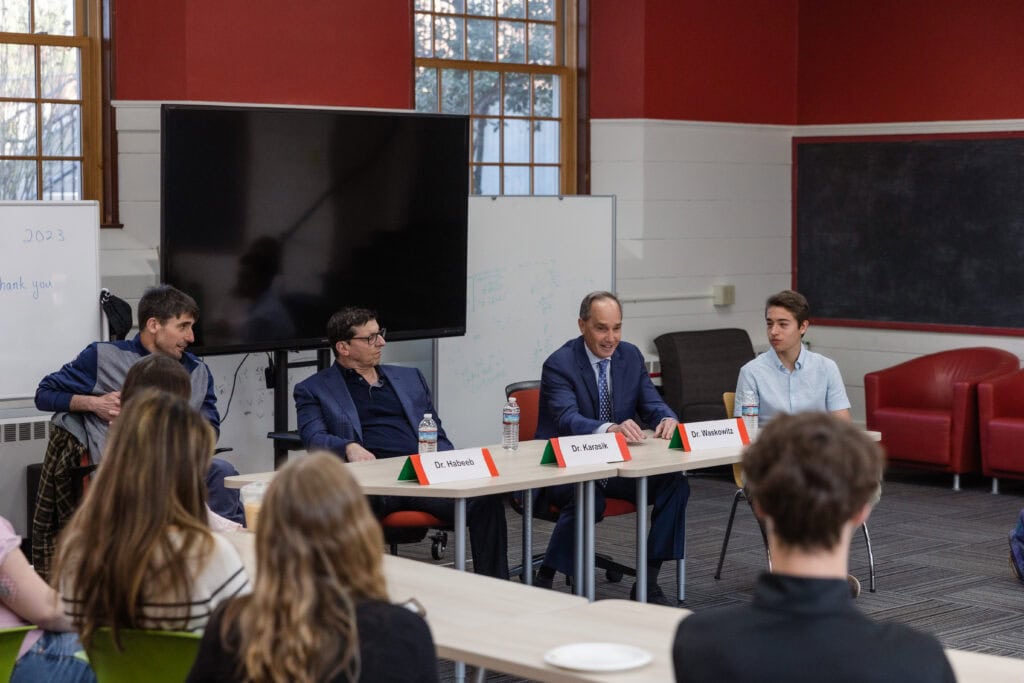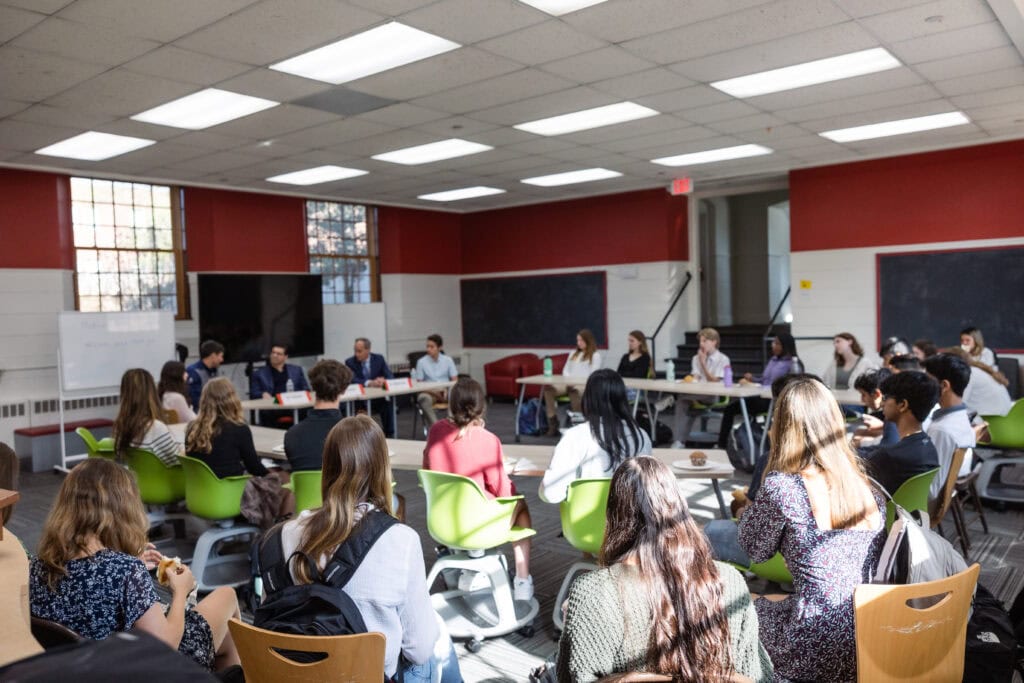April 27, 2023
Lunch and Lead Features Impressive Medical Panel
Three medical professionals from the Kingswood Oxford Community came to share their experiences and journey on a medical panel, at the latest Lunch and Lead (breakfast edition!) on Friday, April 21, 2023. The panel included radiologist Dr. Michael Habeeb, gastroenterologist Dr. Michael Karasik, gastroenterologist and orthopedic Surgeon Dr. Robert Waskowitz.
The group shared their backgrounds and what brought them to the type of medicine they practiced, each with a unique story. Dr. Karasik traveled worldwide in his quest to find his specialty, including spending a summer in Ireland and Paris, each of which allowed him to have opportunities with patients with unique problems few could take care of. He also shared that his brother was diagnosed with a gastrointestinal disease growing up, and there weren’t many suitable treatments. He always kept this in mind as he went through medical school, a puzzle he wanted to solve. Dr. Waskowitz shared that his path was an indirect one. With ties close to the school, he worked as a teacher and a coach at KO before practicing sports medicine as an orthopedic surgeon. He shared with the group that he went in with an open mind and eyes wide open. He encouraged those potentially interested in medicine to do the same. “Exposure gives you the basic sciences, helps direct your path, and lets you figure out your strengths and weaknesses,” said Waskowitz. He highly recommended that students find a mentor that can help guide them. “Test it out, see what you like, and if you don’t like it you have that opportunity to change.” Dr. Habeeb also tried many different avenues before settling on radiology. Unlike Karasik and Waskowitz whose roles are very in-person and patient-focused, he prefers the behind-the-scenes work this arm of medicine affords him.
The format was a Q&A, with questions from the audience as well as ones that had been submitted prior. The discussion began with the question of what characteristics a good leader possesses. Each doctor had similar thoughts centering around digging in and discovering what one is passionate about. The three were in lockstep, with the concept of leadership being self-directed and something an individual has to figure out independently. It also encompasses integrity, self-awareness, empathy, gratitude, and leading by example.
One initial question was how they kept calm under pressure in the operating room. “Ironically, in leadership, you have to fail to succeed, and in the operating room, you can’t succeed,” said Waskowitz. He talked about personally he makes a point to slow down, back away from the table, catch his breath, collect his thoughts, and make sure he is making good decisions.
The group addressed the pandemic and the evident incredible impact this had on the medical community, specifically around the decision-making process and how medicine became emergency medicine or no medicine. Among so many other factors, while necessary, unfortunately, it was to the detriment of many who had to wait to receive a critical diagnosis.
They also identified some positive things that emerged, including the newly developed concept of telehealth and the ability for doctors and nurses to care for, advise and monitor patients virtually. Especially for the elderly population, this will no doubt remain an option for doctors and nurses to connect with patients.
However, even this seemingly positive emergence comes at a cost for some, and Dr. Waskowitz was one of them. Although athletes, a large portion of his clientele, were not competing, people were still getting injured. “The pandemic was a pivot,” Dr. Waskowitz. “As an orthopedic surgeon, I lost that touch, literally and figuratively. I can’t do a physical exam on someone via telehealth.” He also addressed what he thought was one of the most critical aspects of the pandemic, which was the emergence of mental health issues. “Mental health issues were out there, but the pandemic was a magnifier. Part of an injury is the physical side, but for athletes, not being able to compete was another side.”

The panel also addressed the ever-present question of a work/life balance. All said, having other interests outside the medical world was vital, whether as extreme as climbing a mountain or as simple as reading a book. And, often, it isn’t easy to do. “‘I struggle with this every day because you are always pushed and pulled in a direction,” said Dr. Waskowitz. “This is altruistic, a calling. Someone is coming to you with the most precious thing they have, their health, and asking for help. It is a concession you can give up because that is at stake.”
“I failed in this area,” said Dr. Karasik honestly. “There was/is always a patient with a significant problem that is counting on you. I am still in search of this balance.” Dr. Habeeb approached this question differently and joked that this is where he gets to “sell” radiology. “You are an important part of things, but you don’t get invited to the party,” he mused. “When your day is done, it’s done. When I go home, I get to be home.” He noted that when he is home, he is outside because his job requires him to sit in front of a screen all day.
To the question of what role empathy plays, the panelists were quick to agree on the importance of being in the medical field for the right reasons and treating patients the way one would want their own family to be treated.
“You have to take the time,” said Habeeb. “Put your other things aside and try and put yourself in a person’s position.” Karasik agreed. “I have watched plenty of interactions and seen good and terrible. You always have to ask what would I want if this was someone in my family.”
“Empathy is slowing down, listening, and making eye contact, said Waskowitz. “Your patient will tell you what the problem is; you will tell them the path.” He was also impressed that it is ok to say I don’t know but essential to follow up with I can help.

Finally, all three stressed the importance of finding joy, and the fun, no matter what.
“You will find fun a lot in friends, but especially in medicine,” said Habeeb. “You will grind for a long time; you have to allow yourself some fun. For the most part, you will find people will have fun back.”
“You meet lots of good people, make lots of good friends,” said Karasik. “It is very rewarding in lots of good ways. I have a great time with the people I work with and a lot of laughs. “They are my other family.”
Waskowitz agreed, “Have levity, bring lightness into the world. The world is heavy; if you can make it a little more fun along the way, it makes it so much easier.”
